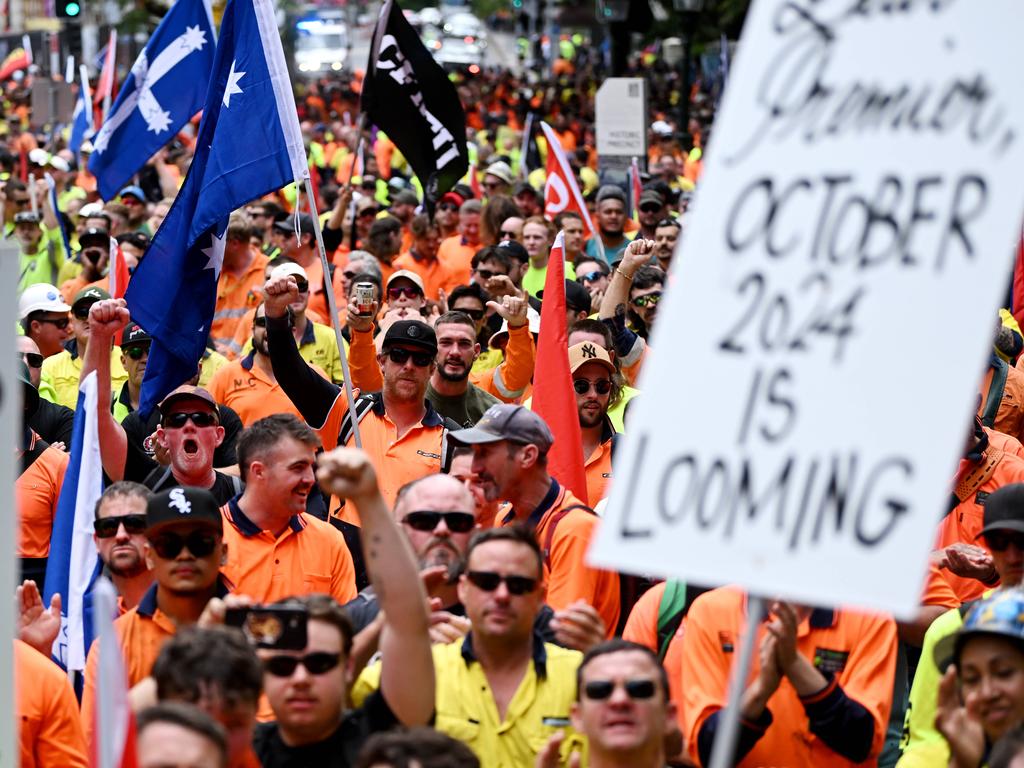Complete history of the CFMEU across Qld: Battles and protests
Love it or hate it, the CFMEU wields power right across Queensland. This is the story of its rise. SPECIAL REPORT
Love it or hate it, the CFMEU wields power right across Queensland.
Formed in 1992, the Construction Forestry and Mining Employees’ Union has had a major say on many projects across the state in the past 30 years.
From controversies to protests, these are the tales of the CFMEU and its true impact on Queensland.
Join the conversation below and cast your vote >>>
February 1992
The Federal Industrial Relations Commission registered a new union, the Construction Forestry and Mining Employees’ Union, formed by an amalgamation of three unions.
The CFMEU amalgamates the Building Workers Industrial Union, the Australian Timber Workers and Allied Industries Union and the United Mineworkers Federation of Australia.
The ACTU recognised the CFMEU as the principal union in the building, forestry and coal mining industries, which entitles it to enrol all workers in those industries.
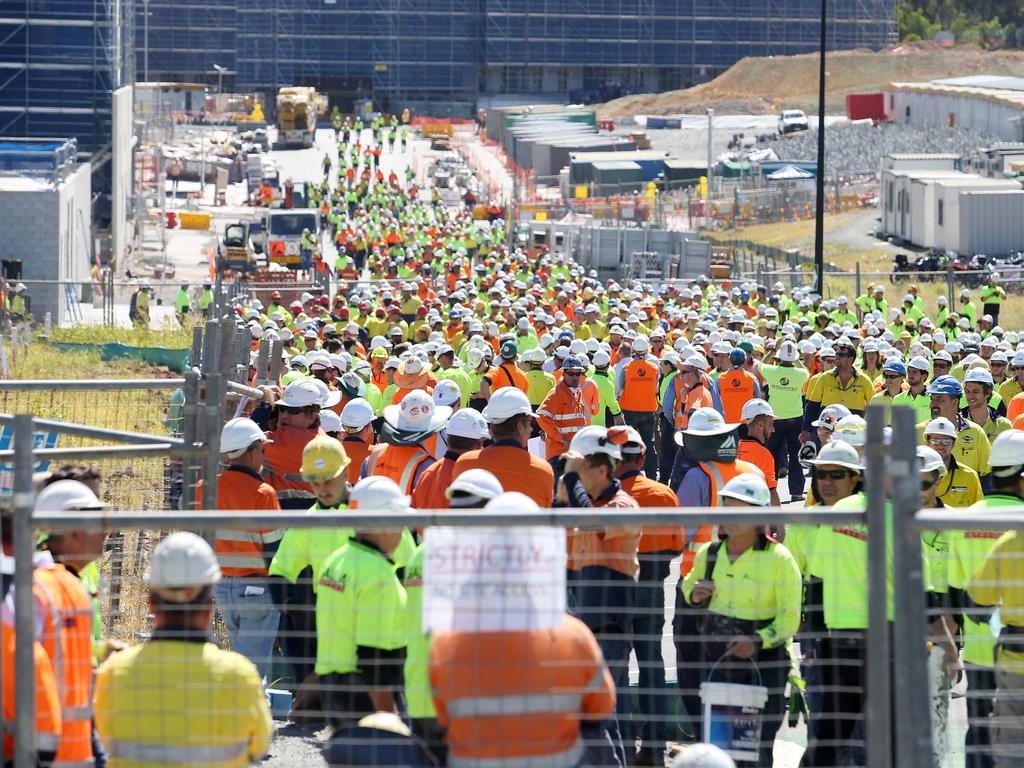
Membership of the new union was expected to exceed 200,000, with the potential to grow to more than 300,000 in a few years.
The new union was to have four autonomous divisions – construction, mining, forestry and energy – with each division electing its own leadership by and from members of that division.
“All amalgamating unions have played distinctive and historic roles in the evolution of Australia’s trade union movement,’’ said a CFMEU spokesman.
May 2000
Hundreds of angry protesters in Brisbane accused mining giant Rio Tinto of human rights breaches and destructive environmental practices.
Union members and shareholders protested for two hours outside a city hotel where the company held its annual general meeting.
The company also was confronted with a backlash from shareholders, who claimed it breached workplace health and safety standards.
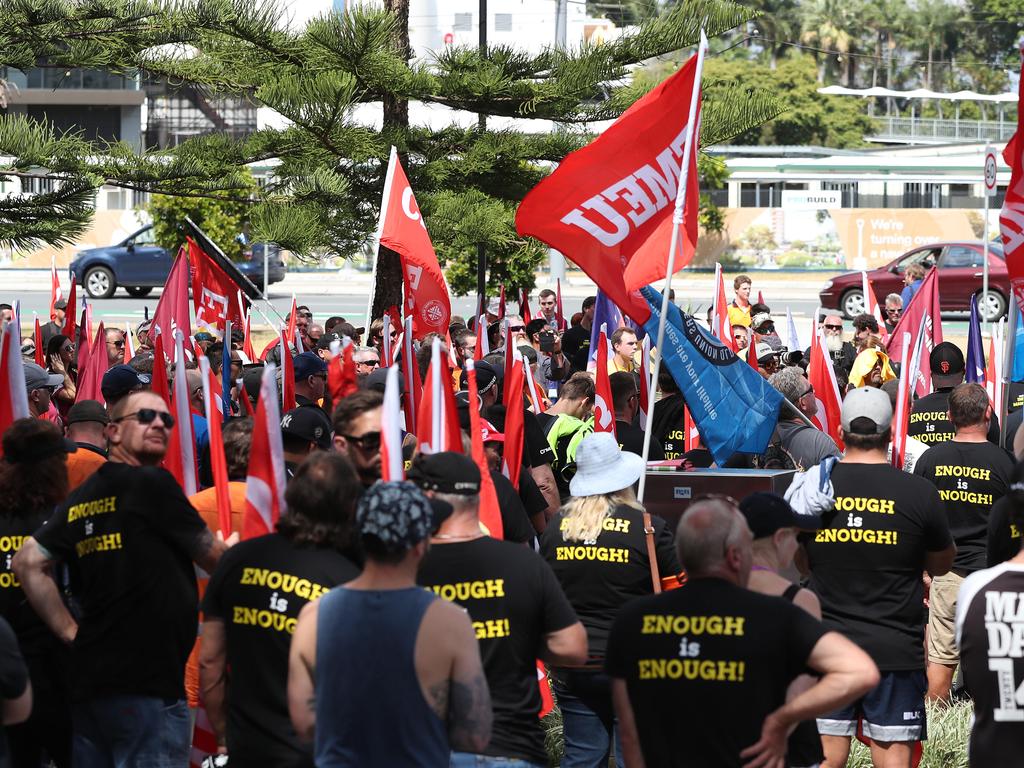
The shareholders called on the Rio Tinto board to comply with International Labor Organisation principles and other world best-practice guidelines.
The Rio Tinto board rejected the shareholders’ resolutions and urged voting shareholders to dismiss them.
The Construction Forestry Mining Energy Union accused Rio Tinto of rejecting the resolutions because the union had conceived and proposed them.
CFMEU national president Tony Maher said there were 300 miners fighting unfair dismissal cases with Rio Tinto and it was necessary that shareholders see the “faces of the company’s victims’’.
“This is not about words on paper, these are real people and there are consequences for management actions,’’ he said.
Rio Tinto boss Sir Robert Wilson accused the CFMEU and other labour groups of conducting a smear campaign that could only hurt shareholders.
May 2010
Premier Anna Bligh was easy to spot at a Labour Day March in Brisbane, but only because her face was on so many protest placards.
With the Premier on a trade mission tour of North America, her deputy, Paul Lucas, both led the march and faced the music as the annual sign of solidarity proved occasionally otherwise.
Mr Lucas was heckled at the start by the Electrical Trades Union, in the middle by the Maritime Union of Australia and by the end of the march he faced a workers’ collective.
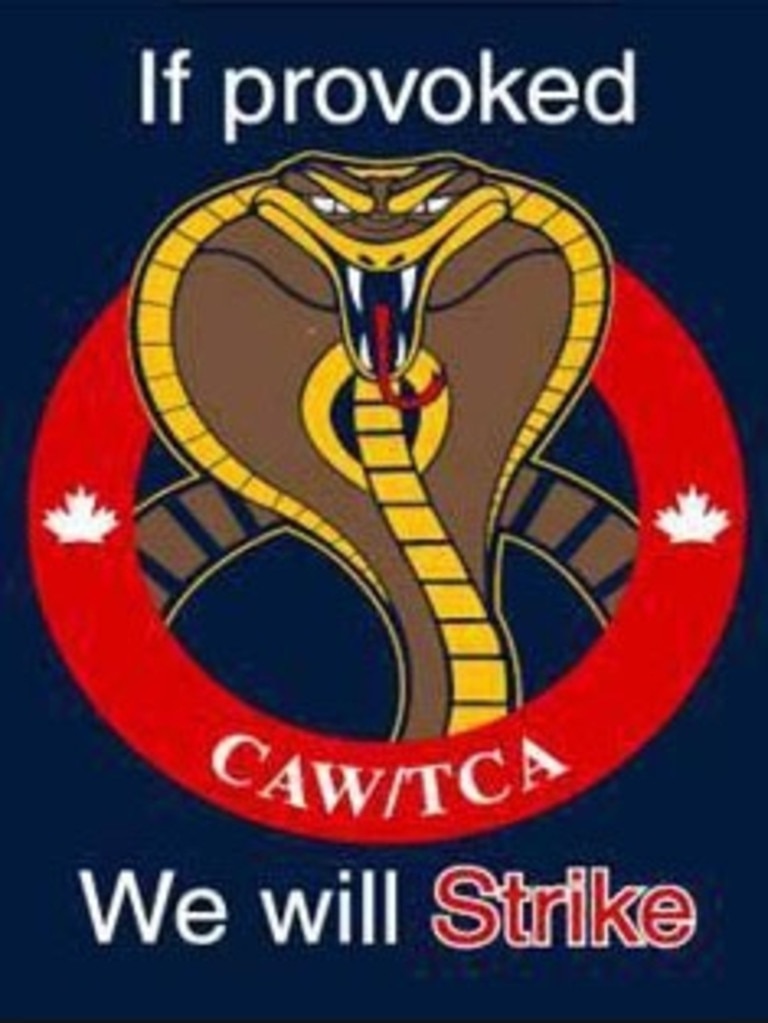
David Matters, secretary of the bus division of the Rail, Tram and Bus Union, confronted Mr Lucas with a verbal battering about the Government’s handling of public transport.
Mr Lucas described the taunts as “democracy in action’’.
Retired painter Ben Hopton led his mates from the Construction Forestry Mining and Energy Union at the protest.
“A couple of mates bet me I wouldn’t come out and lead the CFMEU but I helped form the CFMEU,’’ he said.
June 2010
Construction workers at the Gold Coast’s $18 million Audi Centre walked off the job after the unions shut the site down, deeming it unsafe.
The CFMEU and BLF Union said they were shutting down construction sites on a weekly basis because companies were increasingly cutting safety corners and not complying with regulations.
This shutdown is the third on the Coast in the previous few months.
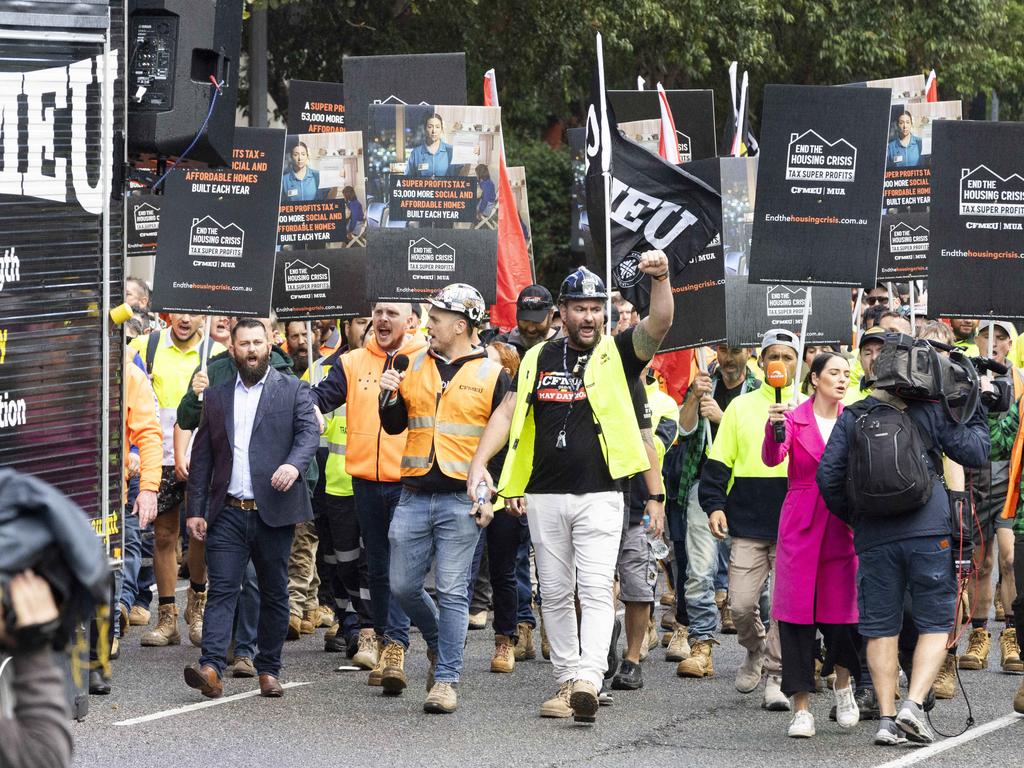
About 35 workers walked off the job at the Audi Centre on High Street, Southport, after calling in the unions and Workplace Health and Safety because of a swag of breaches.
BLF Queensland organiser Adam Olsen claimed there were two pages of breaches after a site inspection which included only two toilets for 35 workers – one of which was deemed unhygienic; unsafe scaffolding with power leads wrapped around the metal bars and some cords running through water; improper exclusion zones around the edges of below-ground work; insufficient amenities and no drinking water.
October 2012
The CFMEU was slapped with a $550,000 fine over a strike that crippled construction of the Gold Coast University Hospital.
In 2011, workers aligned with construction union CFMEU and the Electrical Trades Union walked off the job.
As many as 1300 workers downed tools at the hospital site and another 700 others followed at the new Supreme Court and District Court in Brisbane.
Both sites were contracted to construction company Lend Lease.
Then in October 2012 Federal Court judge Berna Collier found the strike action had severely affected the two major projects, worth more than $2 billion to the southeast corner.
“The unlawful industrial action was protracted, conspicuously public, and co-ordinated across the two project sites,’’ Justice Collier said.
May 2014
The CFMEU was expanding its presence in North Queensland and established a new office and training venue in Townsville’s CBD.
The union’s Queensland and Northern Territory divisional branch secretary Michael Ravbar visited the new office at 446 Flinders St at the time.
Mr Ravbar said the union had experienced strong growth in the region over the past 12 months and needed a venue to match.
“The main reason we have moved to (a bigger office in) North Queensland is that we have always had a presence here and we have had good growth here and we just believed that in the long term, it was a good opportunity to set up a head office in North Queensland,” he said.
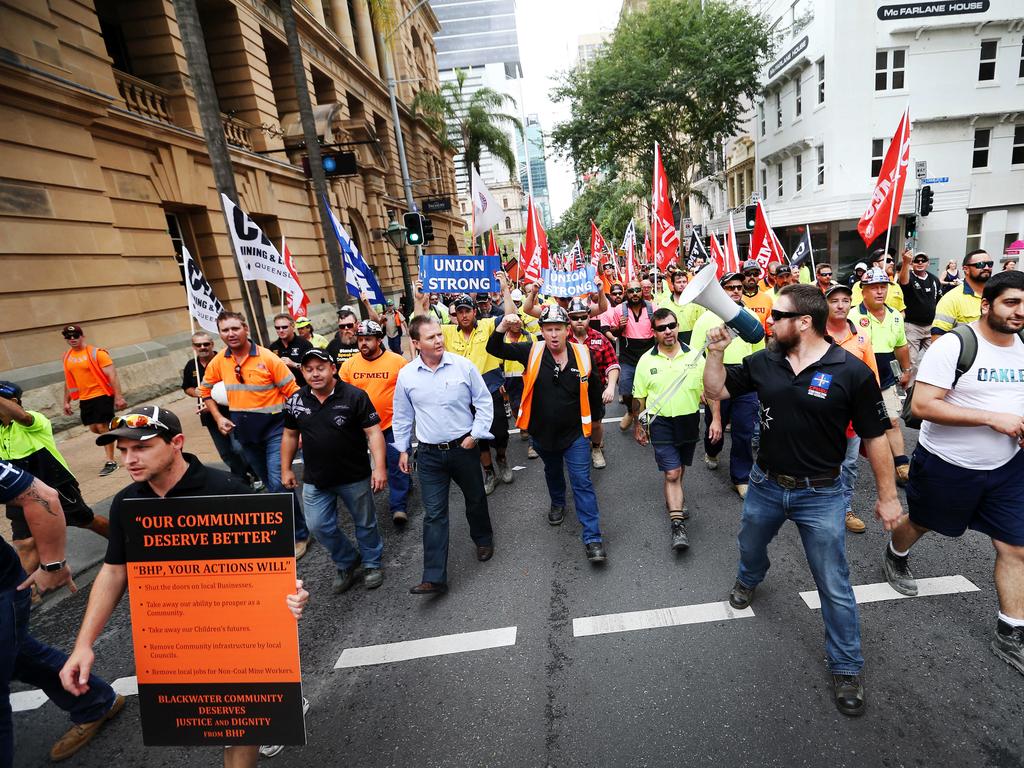
March 2015
The powerful CFMEU called for mandatory drug tests on all work sites in the wake of safety risks posed by people coming to work affected by ice.
The union announced a policy on blanket drug and alcohol testing for employers and employees.
The Construction, Forestry, Mining and Energy Union said people turning up to work under the influence were putting lives at risk.
In the same week that an Australian Crime Commission report painted the stark picture of the rise of ice among the country’s drug users, the CFMEU estimated as many as 5 per cent of construction workers used the drug.
CFMEU national construction secretary Dave Noonan said the drug posed a threat not seen for other recreational drug users.
“The emergence of ice has caused us to have a serious discussion about the way forward,” Mr Noonan said.
May 2016
Union flags were flying over more than $1.5 billion worth of Gold Coast construction sites, with labour bosses flexing their muscles as the city entered a development boom.
At the heart of the resurgence was the Construction, Forestry, Mining and Energy Union, which already had an impact on two major sites: the $670 million Pacific Fair redevelopment and the $122 million Carrara sports centre project.
CFMEU flags also fluttered over the $950 million Jewel development, the $345 million Jupiters casino redevelopment and the $140 million The Beach apartment site.
Political observers said the powerful unions were also emboldened by knowing they had the support of the State Government, which was keeping itself at arm’s length from industrial disputes.
November 2016
The militant CFMEU led more than 700 workers off Brisbane construction sites to protest against foreign workers on the $3 billion Queen’s Wharf Casino project, which had not even started.
Major construction sites in Fortitude Valley and the CBD fell silent at noon as workers marched to Parliament House to pass a motion calling on the State Government to ensure “local workers take preference over foreign labour, including 457 visa holders”.
Union bosses told members to steel themselves for further fights with the federal and state governments in 2017 over foreign workers and the ABCC legislation, which passed Federal Parliament.
The Queen’s Wharf project was not due to begin construction until 2017 but the unions launched the pre-emptive strike to warn the developers and Government that they would only accept “Queensland jobs for Queensland workers”.
CFMEU state secretary Michael Ravbar said the unions would return to Parliament in February if their demands were not met.
November 2017
The CFMEU was slammed for having a “flagrant disregard for workplace rights” by trying to bully tradies to join up under threat of getting their marching orders.
The Construction Forestry Mining and Energy Union and two of its officials were fined $54,500 after attempting to force workers to join up at a major central Queensland construction site in 2013.
Brisbane Federal Circuit Court Judge Michael Jarrett said the action flew in the face of freedom of association principles, which was a core belief of the union movement.
“It involved a flagrant disregard of workplace rights and the freedom of association guaranteed under the Fair Work Act,” he said.
March 2018
The CFMEU and 19 of its officials were fined more than $800,000 over a months-long campaign of illegal stoppages at two Brisbane construction sites.
The Federal Court in Brisbane ruled the CFMEU and its officers had carried out a “deliberate, flagrant and systematic” campaign to force a builder to sign an enterprise agreement on union terms.
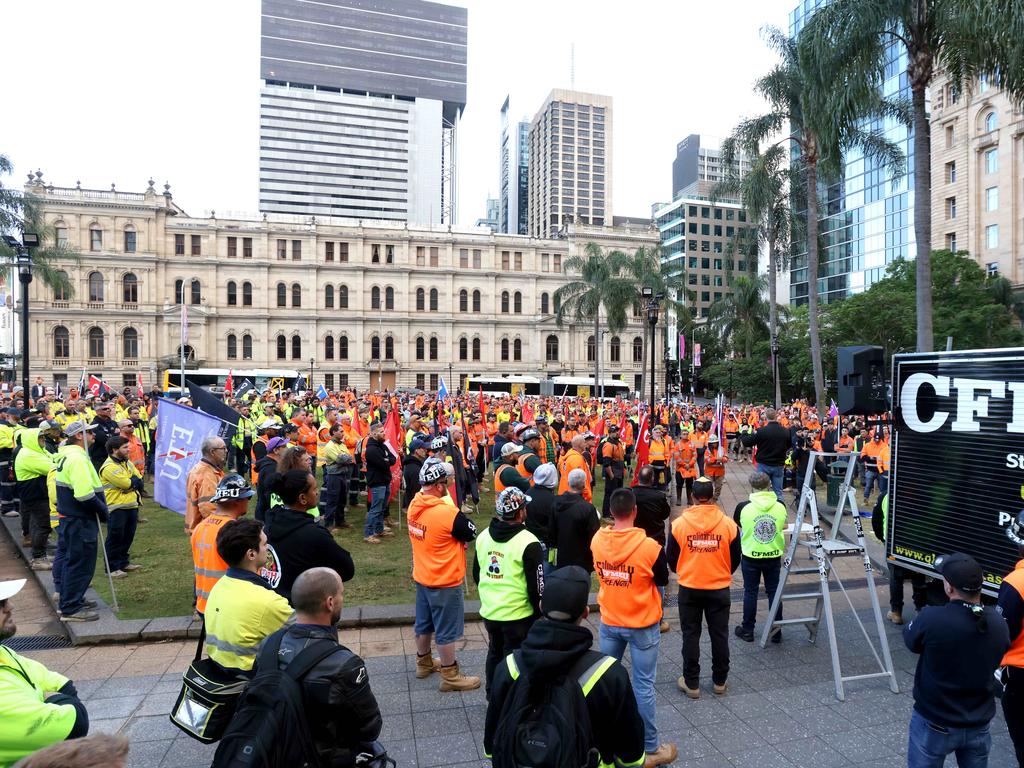
In Sydney, the Federal Circuit Court also fined the union and one official a total of $58,500 for encouraging workers on a Newcastle building site to wear shorts and short-sleeved shirts.
The Brisbane strikes were held during work on the $777 million Enoggera Barracks army base and Queensland University of Technology’s $60 million Kelvin Grove campus between March and November 2013.
Union officials at the QUT site stood in front of cars and prevented workers who wanted to work from accessing the site, according to the Australian Building and Construction Commission.
June 2018
A growing number of worksite call-outs could be blamed on the CFMEU, Opposition industrial relations spokesman Jarrod Bleijie said.
It came after the State Government revealed there were 210 worksite visits after union complaints between June 2017 and May 2018.
Workplace Health and Safety Queensland inspectors also made 25,611 worksite visits in the same period.
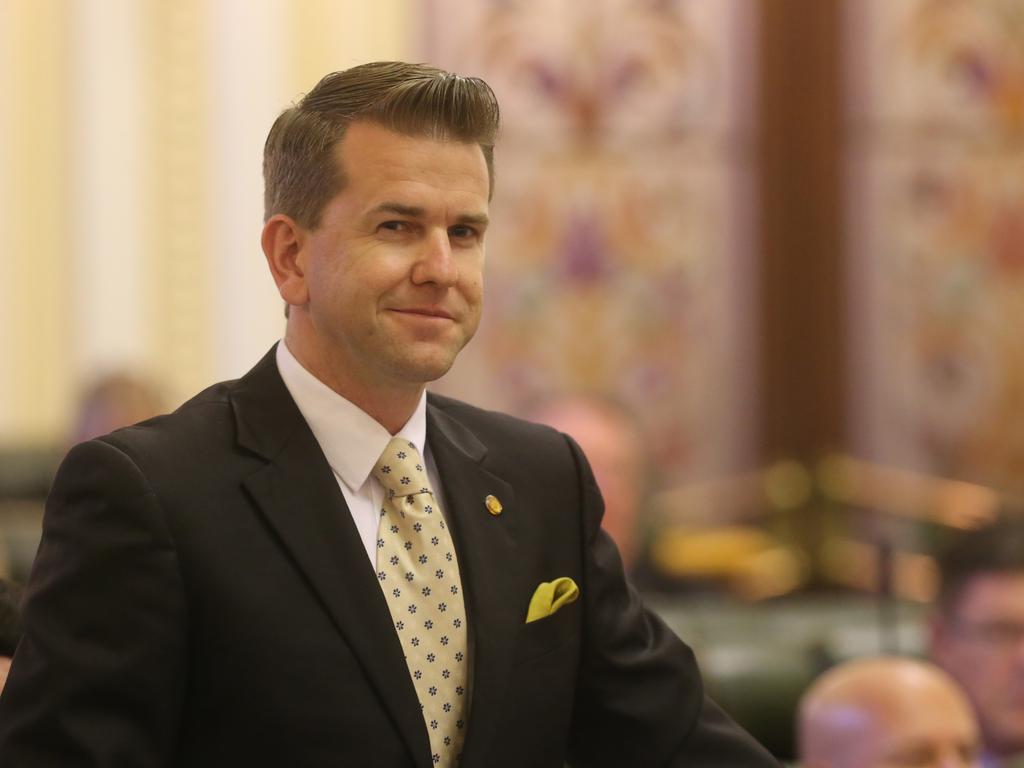
Between April 2017 and March 2018, three inspectors from the Office of Industrial Relations resigned, one transferred out and six applied for sick leave citing stress. None cited union abuse as a cause.
“Having over 200 complaints in 12 months shows they (CFMEU) believe they run the organisation,” Mr Bleijie said.
Industrial Relations Minister Grace Grace said that the numbers of inspector visits demonstrated the large-scale nature of workplace health and safety enforcement being undertaken.
CFMEU did not comment.
November 2018
The CFMEU wiped its hands of responsibility for a cost blowout at North Queensland Stadium.
As far back as May 2018 it had been speculated the costs at the stadium were quickly being driven up and sources said “petty” workplace safety requirements being enforced by union officials were a major factor.
However, CFMEU state secretary Michael Ravbar blamed construction company Watpac for the problems.
“The reality is that the job is behind schedule, workers are being pushed to the limit and beyond, and safety has become a secondary consideration,” Mr Ravbar said.
“Workers are being pushed to put in 14-hour days in an attempt to compensate for what has been woefully inept management of this project.”
Mr Ravbar said numerous major safety concerns had been identified and it was unfair to blame the workers.
November 2019
The CFMEU threatened to withdraw its support for Labor and even follow the Premier around the state ahead of the 2020 state election if its Cross River Rail demands were not met.
It came as hundreds of construction workers marched to Parliament House to slam the Government’s handling of the $5.4 billion project – with the union claiming it had been mismanaged.
The union’s state secretary Michael Ravbar said the Government should be concerned about a CFMEU campaign, insisting it could be a deciding factor in the election.
He left the door open for the union to withdraw its support from Labor in the lead-up to the October 2020 poll if its concerns with the project were not addressed.
“We’ve done that before,” Mr Ravbar said.
“We did that with Anna Bligh – a very similar thing with the airport tunnels.’’
It was understood the CFMEU wanted enterprise agreement conditions for the CRR that mirrored Queen’s Wharf.
The union claimed there is nothing in the agreement to promote traineeships.
But a Cross River Rail Delivery Authority spokeswoman said information distributed by the CFMEU was “factually inaccurate” and included “misleading statements”.
March 2020
The CFMEU lashed out at Cairns Regional Council for making no special provision for Covid leave for staff and failing to provide workers with essentials like running water, toilet paper and soap.
Queensland Workplace Health and Safety inspectors visited two council construction sites at the time and issued one notice over hygiene.
“The notice related to a lack of water running … in a portaloo and the absence of toilet paper, which had been stolen the previous night. Both issues were rectified immediately,” a council spokesman said.
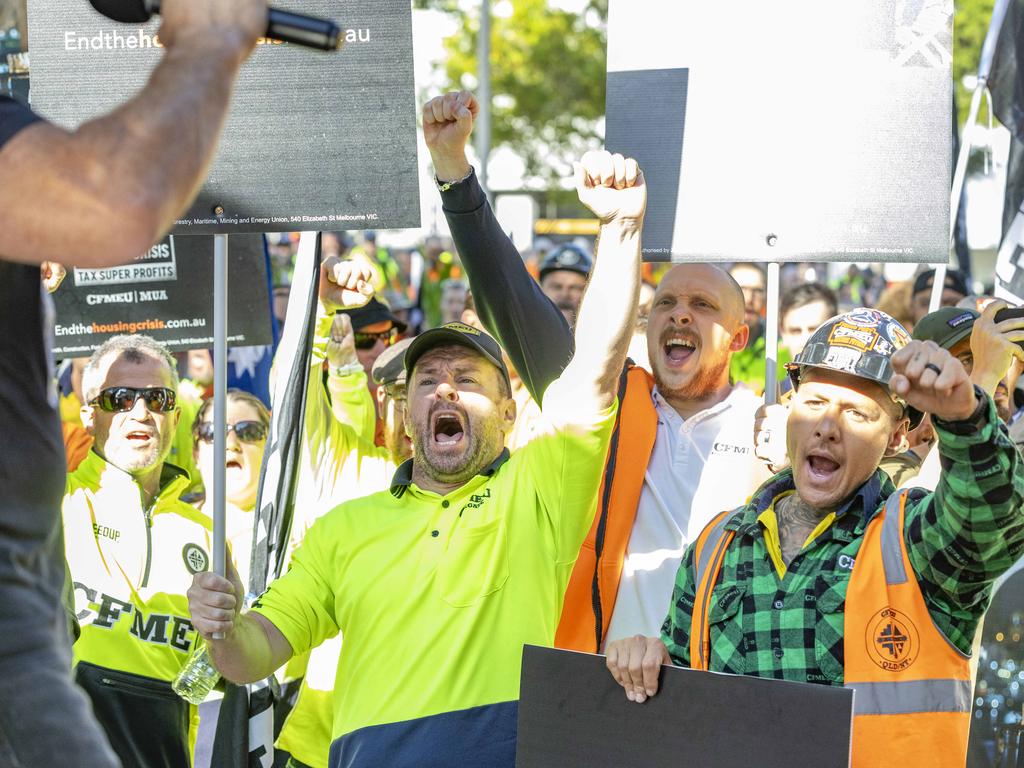
CFMEU regional organiser Rolly Cummins said many worksites had toilets with no paper, soap or hand towels – let alone sanitiser – and training about social distancing and other coronavirus measures had been next to non-existent.
Mr Cummins said workers, many on casual contracts, feared for their jobs with the council refusing to negotiate leave mechanisms.
He warned it could lead to staff deciding to attend work despite being unwell.
The council spokesman said all staff and unions were provided with regular Covid updates and advice, and staff had been given “necessary” hand sanitisers, disinfectants and surface cleaners, including sanitary wipes.
September 2020
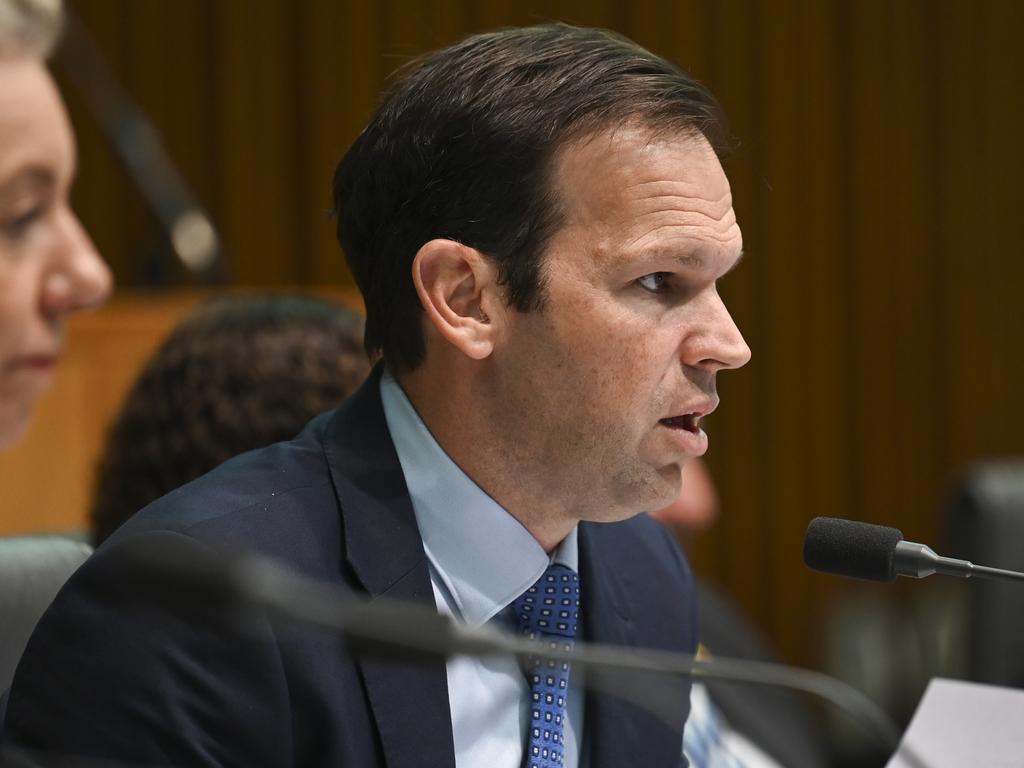
In a stinging response to a provocative letter from LNP politicians asking the CFMEU to support the party at the state election, the union’s mining division Queensland president blasted the missive as a “silly stunt”.
Stephen Smyth strongly rejected the request, disagreeing with the assertion that the LNP supported coal mining jobs.
“Support for workplace rights is non-negotiable when it comes to our union’s support to any candidate or party,” he wrote back.
Mr Smyth said the LNP was not representing workers on “mass casualisation” of the workforce.
“It is no wonder you are struggling to find supporters to assist with election campaigning,” he said.
Returning fire, Queensland senator Matt Canavan accused the union of “hiding behind a fig leaf” to keep backing Labor.
Coalition MPs had told the CFMEU that if they believed Labor’s left faction had turned its back on coal workers, they should campaign for the LNP instead.
February 2021
A federal justice blasted the CFMEU’s record as “shameful and deplorable” as he slapped it with a whopping $287,500 in fines for illegal strike action which shut down construction on the North Queensland stadium.
The militant construction union was found guilty of unlawful industrial action against a subcontractor on the $293m project to coerce it into an enterprise agreement, with officials calling the boss a “f--king dog” and “a piece of sh-t”.
It comes one week after Opposition leader Anthony Albanese promised to scrap the construction watchdog, the Australian Building Construction Commission, which prosecuted the case.
Justice Daryl Rangiah, in handing down his judgment yesterday, said the contraventions were “very serious”.
“It has been recognised that, ‘coercion is a particularly serious form of industrial conduct’,” Justice Rangiah said.
“The unions record of contraventions has been described in other cases as ‘disgraceful and shameful’, ‘deplorable and dismal’ … I agree with those descriptions.”
A CFMEU spokesman said the case showed the ABCC and the industrial relations system were not working and that the courts were punishing the victims.
July 2021
The CFMEU launched a public attack on Central Queensland Senator Matthew Canavan after he missed powerful testimony from mine workers on casualisation in the Bowen Basin.
“Senator Canavan likes dressing up as a coal miner, but he didn’t turn up to hear evidence from coal workers or mining community leaders at the job security Senate inquiry, even though he’s the deputy chair,” a social media post read.
Stephen Smyth, president of the union’s mining arm, sent a formal letter to Mr Canavan expressing his disappointment over his absence.
There was no requirement that Mr Canavan be present for every hearing of the Senate Select Committee on Job Security despite being Deputy Chair.
Mr Canavan said he had a prior engagement that prevented him from being present for the whole two days but he did call in remotely to ask a number of questions throughout the hearing.
February 2022
Insiders claimed that Queensland’s militant CFMEU could control every major construction site across the state as part of a new “deal” drawn up by the state government, which could cost taxpayers hundreds of millions of dollars.
New requirements developed by the Department of Transport require projects worth $100m and above to include a Best Practice Industry Conditions agreement.
The agreement, supported by Left-faction Transport Minister Mark Bailey, required a building company tendering for a government contract to negotiate with left-leaning unions including the CFMEU.
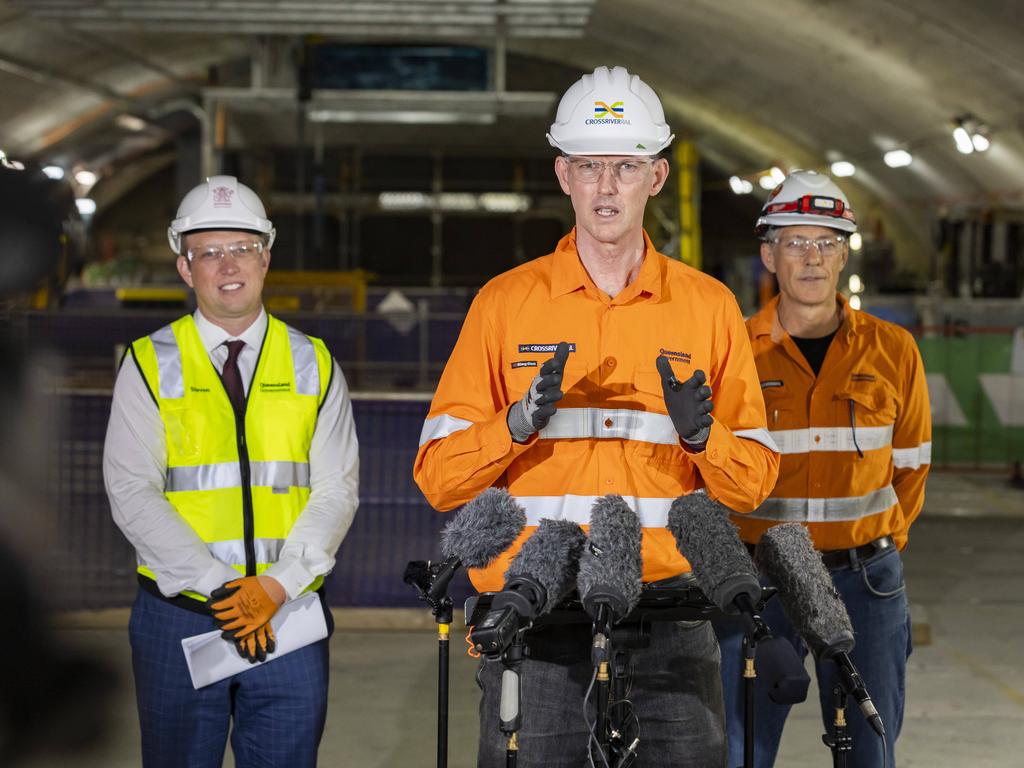
While it is not compulsory for a contractor to sign the agreement, industry sources said they were being pressured to agree to union enterprise demands or risk missing future government contracts.
Mr Bailey declined to say whether companies were being pressured to sign the industry condition agreement and if they could lose future government contracts on refusal.
The industry conditions agreement will give the CFMEU a greater input in the civil construction of roads and tunnels, which had traditionally been the remit of the Australian Workers Union (AWU).
Construction industry insiders feared the new conditions agreement would give the CFMEU more say over every major construction project in the state.
“The government is putting a gun to the head of major contractors and saying, ‘let the CFMEU in or risk future work’,” an insider said.
Both the CFMEU and AWU declined to comment.
June 2022
Union boss Michael Ravbar took aim at Premier Annastacia Palaszczuk, urging her to take swift action against lobbying if she was serious about restoring public trust.
The CFMEU state secretary – also a member of the ALP’s national executive – released a scathing statement, saying the time for “empty platitudes and vague promises” was over.
He claimed that in some instances the “web is so tangled” that it was hard to separate external lobbyists, such as Labor-linked Anacta, from the innermost workings of the Palaszczuk government.
His cutting comments came in the wake of the Crime and Corruption Commission (CCC) revealing that it was stepping up its probe into lobbying in the state.
The watchdog said an intelligence investigation had found a small number of “key groups and individuals” – including some with close political connections – appeared to have “disproportionate” access to government decision makers.
Mr Ravbar seized on the CCC’s warning, asking how many more inquiries, audits and reports the government needed before taking action.
Anacta declined to comment when asked to respond to Mr Ravbar’s statement.
The union boss suggested the CFMEU had raised concerns about lobbying at the last Labor state conference.
“Yet regrettably the Palaszczuk government has displayed a determined reluctance to do anything more than hope the problem will just go away,” he said.
“Here’s some free advice – the issue is not going to disappear, and if Ms Palaszczuk is serious about restoring public trust she must move swiftly to excise this cancer.”
Treasurer Cameron Dick denied that the government gave disproportionate access to Labor-aligned lobbyists.
August 2022
Unionists who stormed a Brisbane CBD government building owed affected public servants an apology, Premier Annastacia Palaszczuk said, slamming the behaviour of protesters as “disgraceful”.
Public servants working within the Transport and Main Roads headquarters on Mary St were put at risk, a security guard knocked down, the building locked down, and events cancelled after more than 200 CFMEU members forcibly entered the office block about 9am.
The Construction, Forestry, Mining and Energy Union (CFMEU) refused to apologise, describing the furore as a “storm in a teacup”.
Ms Palaszczuk and Transport Minister Mark Bailey condemned the protest as “disgraceful”.
The state government also moved to quash assertions Mr Bailey, who had met with CFMEU officials, had any prior knowledge of the protest and opted to cancel a planned appearance at an event in the building as a result.
The CFMEU had in recent times voiced its gripes with “systemic noncompliance” with government policy — specifically the new Best Practice Industry Conditions agreement.
Deputy Opposition Leader Jarrod Bleijie, labelling the protest “far too serious to do nothing” called for an investigation to be conducted and for the state government to stop meeting the CFMEU.
CFMEU assistant secretary Jade Ingham said the workers at the protest were “nothing more than key stakeholders” wanting to “have a say on issues impacting on their working lives”
March 2023
The CFMEU claimed it was only a matter of time before a worker was seriously injured or killed on the worksite where the largest wind farm in the southern hemisphere was being built.
Work on the MacIntyre Wind Farm began in late-2022, and in that time several prime movers and dump trucks had rolled, including one carrying a massive wind turbine blade.
In January a crane operator was sent to a nearby farm for a tank of water when it struck an overhead power line, bringing it down and starting a grass fire.
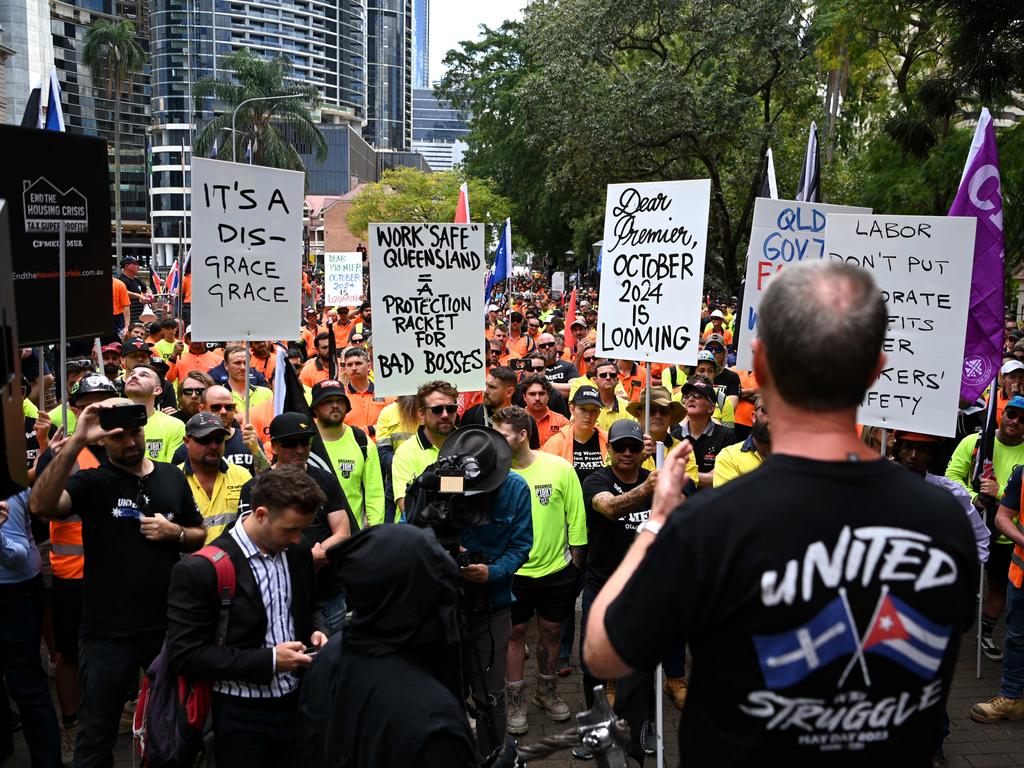
CFMEU Assistant Secretary for Queensland and the Northern Territory Kane Lowth said the downed powerline electrified the crane and forced the operator to do a “superman jump” from the cab or risked receiving a fatal shock.
The union alleged the crane operator was sent in to the neighbouring farm without proper preparation and as they were reversing struck the powerline.
“Since 2018 there have been no fatalities on CFMEU sites and when you look at all the building sites we are at, that is a pretty good record to have. I know people who have left in management (at the MacIntyre Wind Farm) because they can see a death coming and they don’t want their name on it,” Mr Lowth said.
July 2023
Queensland’s largest infrastructure project ground to a halt amid a mass tradie revolt with the minister responsible for the project conceding he would be “concerned” to be a worker on the beleaguered mega rail line.
It came as the safety regulator confirmed the $6.3bn Cross River Rail project had been issued with 331 warnings to that point.
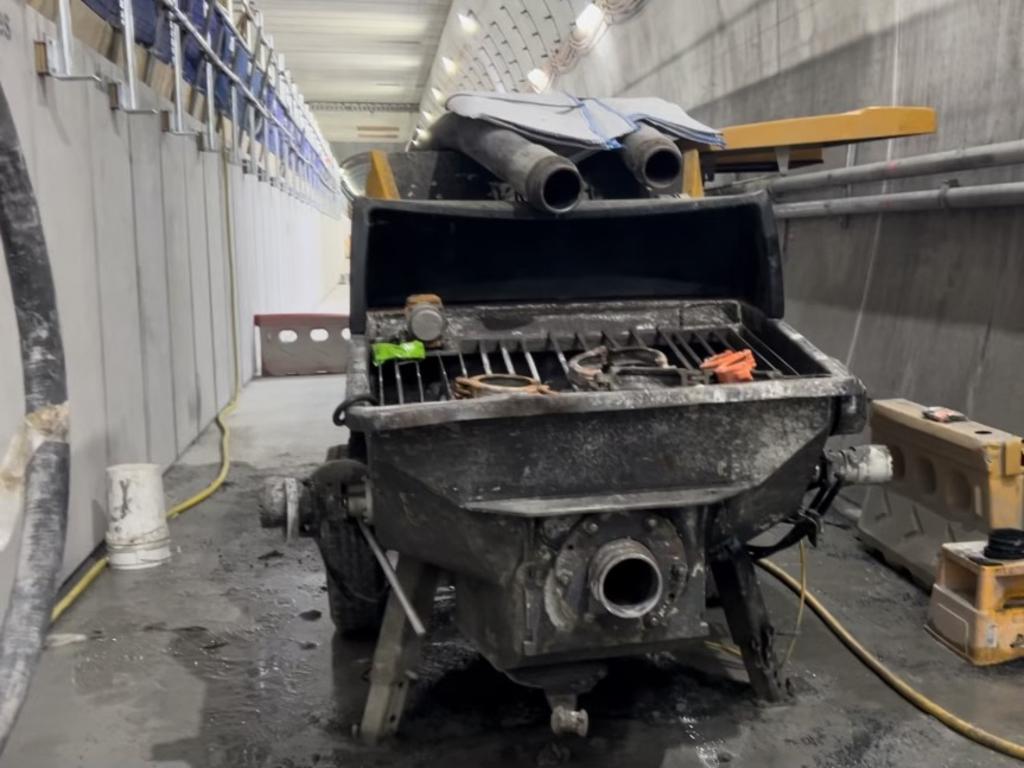
Transport Minister Mark Bailey ordered a detailed safety audit of the Cross River Rail project – a 10.2km rail line from Dutton Park to Bowen Hills – describing a recent incident as a “wake-up call”.
Construction across the project’s 15 sites was halted after workers unanimously agreed to down tools, with hundreds marching through the Brisbane CBD chanting “workers lives are not for profit” and “Cross River fail”.
CFMEU Queensland assistant state secretary Jade Ingham said the union had raised safety concerns across Cross River Rail sites “daily”, with head contractor CPB Constructions revealing to them a site-wide audit of scaffolding and formwork had been conducted just recently.
Workplace Health and Safety Queensland confirmed it had issued 337 enforcement notices as of June 30, 2023, including 268 “improvement” notices, 30 infringements carrying small fines and 38 stop-work “prohibition notices”.
August 2023
The CFMEU was attempting to lure traffic control workers to the Gold Coast light rail project with the promise of wages almost twice the award – as the state government project suffered a $500m blowout.
A flyer being circulated by the union showed the CFMEU spruiking full-time wages as a traffic controller of almost $50 per hour for a 36-hour work week – with casual rates above $62.
It also offered more than $22 a day for meals, $37 for travel and two RDOs per month on the project.
But civil construction insiders said some workers were much more likely to work closer to 50-hour weeks – meaning their hourly rate at time-and-a-half could easily push $75.
The job ad came after whistleblowers claimed that the government’s Best Practice Industry Conditions policy was costing taxpayers millions of dollars and slashing productivity.
The policy – backed by the CFMEU and ministers Mick de Brenni and Mark Bailey – came under fire by a number of top construction insiders who claimed it was adding significant cost pressures to already under-strain key projects.
A CFMEU spokesman said traffic controllers had one of the highest risks of fatality, and it was a “very dangerous” job.
September 2023
Thousands of CFMEU workers marched on parliament, accusing Annastacia Palaszczuk of leading an “arrogant, lazy” government that has betrayed the working class.
The CFMEU-organised demonstration demanded the Palaszczuk government act on several calls to “fix” what they described as a “broken workplace health and safety system”.
It was the third mass work stop in as many months, since scaffolder Nation “Nash” Kouka was left fighting for life after a fall at the Boggo Road Cross River Rail construction site.

CFMEU state secretary Michael Ravbar said the lives of workers and the public are being put at risk by systemic failures of safety oversight.
“The Premier talks a lot about representing working people but betrays them when it matters most,” he said ahead of the march.
“Queensland’s workplace safety laws are substandard, the regulator is unresponsive and the attitude of the Minister for Industrial Relations is a disgrace.”
November 2023
The family of Tyler Whitton made a heartfelt plea for more work to be done to stop workplace fatalities during a CFMEU protest in Brisbane.
Union members used the rally to call for an independent review of the Office of Industrial relations and an overhaul of Workplace Health and Safety Queensland.
Protesters were marching outside Parliament House after a spate of fatalities on Queensland construction sites.
Among those are the family of Tyler Whitton, a 17-year-old boy who died at a West End worksite in September.

February 2024
Brisbane commuters faced serious delays and traffic chaos in the CBD as a result of a CFMEU protest.
Police warned motorists that there would be multiple road closures in the CBD due to a CFMEU protest.
The protest was calling for safer work conditions in the Queensland heat.
The protest comes following the death of construction worker Daniel Talolua Sa’u in December 2023.
Mr Sa’u tragically died only a few hours after leaving the Cross River Rail project site in Salisbury on December 28.
It is understood police found Mr Sa’u dead in his car in Moorooka around 3.30pm.
The CMFEU claim the father of three died after showing signs of heat stress.
In a post to Facebook, Mr Sa’u’s wife Geraldine Sa’u said the protest is to raise awareness of heat stress.
In a GoFundMe for the Sa’u family, fundraiser organiser and friend Eden Mataito said their world was “changed forever” when family and friends suddenly lost Mr Sa’u as he was on his way home from work.
March 2024
At least a dozen of the state government’s signature major health projects were delayed by up to 2.5 years or been hit with cost blowouts, documents revealed in March 2024.
And a handful of other projects, including a new $1.2bn hospital in Bundaberg, were on the brink of being hit with delays as authorities attempt to manage environmental, weather or contract issues.
Analysis of documents released to the Opposition and information provided by Health Minister Shannon Fentiman’s office revealed the budget for 12 projects impacted by time or cost blowouts had risen by $51.8m to a total of $2.29bn.
The revelations came as it was claimed the so-called “CFMEU tax” was not helping the situation.
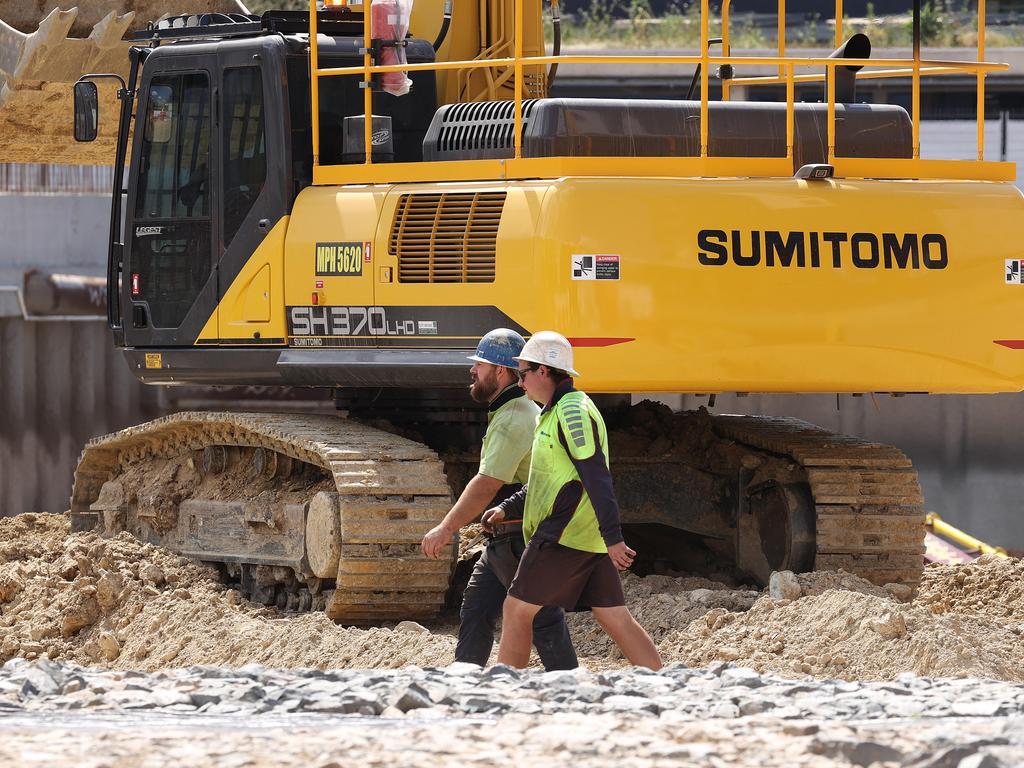
April 2024
CFMEU workers on Brisbane’s $6.2bn Cross River Rail project walked off the job over unmet demands for huge pay rises that would see an entry-level construction worker earn $240,000.
Six months of negotiations between the militant union and major contractor CPB Contractors were tipped to reach a climax as CFMEU workers launched four days of protected industrial action, with workers seen lining the streets at key sites.
Queensland Police were on scene at seven CFMEU protest sites, with the biggest group seen at Roma St.
Protests also popped up at Yeerongpilly, Dutton Park, Rocklea, Spring Hill, the CFMEU branch at Bowen Hills, and Mary St in the CBD.
It’s understood workers started gathering at the sites from about 3.45am.
Over the coming days tensions flared as the Federal Court granted an “urgent injunction” order stopping the CFMEU from blocking access to Cross River Rail sites.
May 2024
CFMEU members were physically assaulted by a contracted security guard at a Brisbane worksite following a tense stand-off, the union has claimed.
The Centenary Bridge upgrade site in Brisbane’s southwest suburb of Jindalee, was locked off after CFMEU workers arrived just after 1pm.
Workers inside the site locked the gates and works were at a standstill as about 50 CFMEU workers surrounded the Jindalee site.
CFMEU state secretary Michael Ravbar said two CFMEU organisers were physically assaulted for “simply doing their job”.
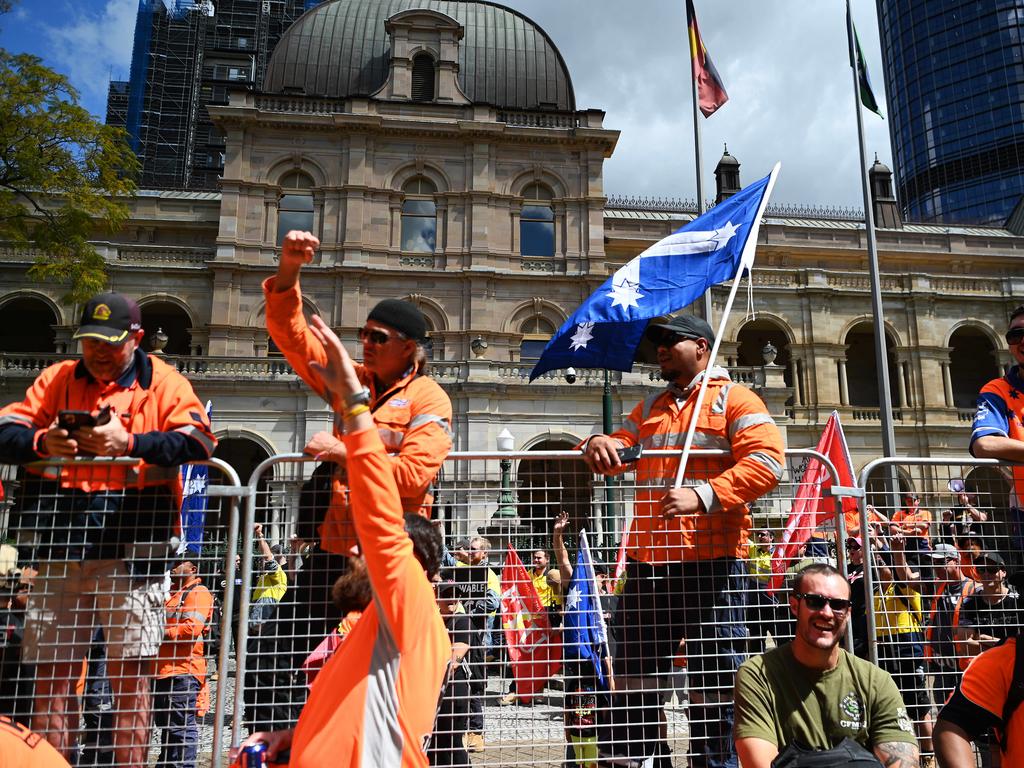
June 2024
The construction division of Queensland’s militant CFMEU would be emboldened by major changes that would make it easier for the union’s manufacturing division to break away, insiders said.
Federal Workplace Relations Minister Tony Burke was planning to introduce legislation to allow the manufacturing division of the CFMEU quit the amalgamated union.
It would provide for a secret ballot where members could vote to demerge the manufacturing division from the CFMEU.
“We will provide the opportunity for members of the manufacturing division to vote on their future, because the status quo is dysfunctional and cannot continue,” he said.
July 2024
Major contractors, business owners and the state opposition demanded Premier Steven Miles cut ties with the Queensland CFMEU, claiming bullying, harassment and standover tactics remain rife on the state’s construction sites.
The CFMEU’s Victorian branch was put into administration and the national office seized its executive powers, following allegations of corruption and standover tactics linked to that state’s $100bn big build program.
The state government then played down claims of similar issues in Queensland but encouraged anybody with any similar claims to contact authorities.
July 2024
Prime Minister Anthony Albanese on July 17 confirmed the Queensland CFMEU will be appointed with an independent administrator.
Mr Albanese said the government was prepared to legislate the administration process to ensure administrators are quickly appointed to the New South Wales, Victorian and Queensland CFMEU branches.
“We’ve acted swiftly to ensure that administrators are put in if there’s any challenge to that we’re certainly prepared to legislate to ensure that that occurs,” he said.

November 2024
Pro-union best practice industry principles on major Queensland government projects were temporarily halted immediately.
Deputy Premier Jarrod Bleijie, in a major speech revealed Best Practice Industry Principles would be temporarily suspended.
“This will relate specifically to the industrial relations element of the best practice principle, while preserving Workplace Health and Safety Systems and standards and best practice commitment to apprenticeships and trainees,” Mr Bleijie said.
June 2025
Surprise CFMEU protests sprung up across Brisbane city in response to the High Court’s refusing to overturn the militant union’s federal government takeover.
Hundreds of union members gathered at multiple sites, blocking intersections and causing major traffic delays.
More than 200 CFMEU members were seen marching on Queen Street in the Brisbane city, while 500 protesters were in Bowen Hills.
July 2025
Deputy Premier Jarrod Bleijie launched a blistering attack on Labor MPs for “enabling” the militant CFMEU for a decade, allowing violence and abuse of women and children to go unchecked.
The state government was handed the bombshell Watson Review, but will not move to dissolve or deregister the Queensland branch.
Mr Bleijie singled out Labor MPs Grace Grace, Shannon Fentiman and Mick de Brenni for creating a protection racket around the CFMEU and turning a blind eye to a culture of misogyny and coercion.

November 2025
Heavyweights of the militant CFMEU proudly operated above the law and made fear their business model to gain influence in the construction industry, an inquiry heard.
Former Queensland CFMEU leaders Michael Ravbar and Jade Ingham also allegedly modelled their behaviour on the disgraced Victorian union branch to cut rival unions out of the building sector.
These were among the claims unearthed in an extraordinary first day of testimony at the landmark Commission of Inquiry into the CFMEU and misconduct in the construction industry.


